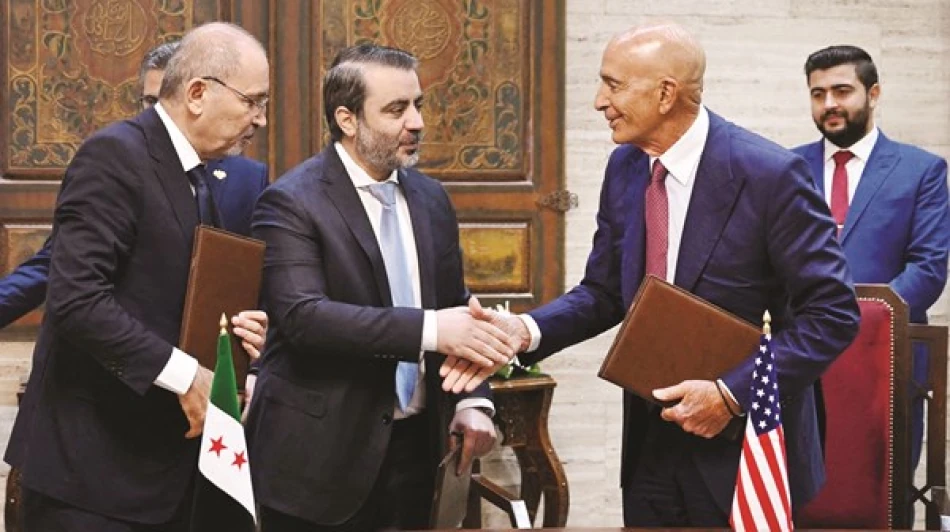
UAE Welcomes Roadmap to Resolve Sweida Crisis, Explores Path to Lasting Peace
Syria Secures Fragile Peace Deal for Suwayda Province as ISIS Threat Resurges
Syria's new government has reached a breakthrough agreement to resolve tensions in Suwayda province, backed by Jordan and the United States, marking a critical test of Damascus's ability to maintain stability across its territory. However, experts warn that ISIS remains a persistent threat with active cells continuing to operate throughout the country, potentially undermining broader reconciliation efforts.
Diplomatic Victory in Suwayda Sets Precedent for National Reconciliation
The UAE welcomed Syria's announcement of a roadmap to resolve the crisis in Suwayda province, praising collaborative efforts by Jordan and the United States. The agreement represents one of the first major diplomatic successes for Syria's transitional government in addressing local grievances while maintaining territorial integrity.
US Special Envoy to Syria Tom Barak emphasized America's commitment to supporting the Syrian government's security and stability efforts. "Cooperation with Syria and Jordan has led to a roadmap that ensures civil peace and rebuilds trust and tolerance," Barak stated on X, describing the Damascus-signed agreement as charting "a path that future generations of Syrians can follow as they build a homeland with equal rights and duties for all."
Practical Steps Toward Stability
The roadmap outlines concrete measures including accountability for those who attacked civilians and their property, coordinated with UN mechanisms. It guarantees continued humanitarian and medical aid flows, compensation for victims, village reconstruction, and facilitating displaced persons' return. Crucially, it establishes an internal reconciliation process involving all Suwayda residents.
This approach mirrors successful reconciliation models used in post-conflict societies, though Syria's fragmented landscape presents unique challenges. Unlike Lebanon's Taif Agreement or Iraq's post-2003 reconciliation efforts, Syria's process must contend with ongoing security threats and economic devastation.
ISIS Resurgence Threatens Fragile Progress
While diplomatic efforts advance, security experts sound alarm bells about ISIS's persistent presence. Syrian political analyst Nawaf Khalil emphasized that the terrorist organization hasn't disappeared from Syria and Iraq, with both active and dormant cells remaining operational alongside affiliated groups continuing attacks.
"ISIS involvement in most terrorist incidents across the region—whether in Syria, Iraq, or Africa—demonstrates the organization's continued relevance," Khalil told Al-Ittihad. Despite Syrian Democratic Forces successfully cutting supply routes in Deir ez-Zor, ISIS fighters have secured weapons and recruited new members elsewhere, leading to escalating terrorist operations.
Strategic Targets and Operational Capabilities
The organization continues targeting prisons holding over 10,000 ISIS militants, including the notorious al-Sina'a prison, alongside camps like al-Hol housing thousands of ISIS-affiliated families from various nationalities. These facilities represent both strategic assets for potential jailbreaks and recruitment centers for future operations.
Terrorism researcher Munir Adib noted ISIS's success in "penetrating security barriers and executing dozens of sophisticated operations," confirming that the ISIS threat remains present and could explode at any moment amid political instability affecting security conditions.
Economic Reconstruction as Counter-Terrorism Strategy
Experts advocate for comprehensive support combining political, economic, and security assistance to strengthen Syria's capacity against extremist organizations. This approach recognizes that military solutions alone cannot address root causes of radicalization—unemployment, destroyed infrastructure, and social grievances that terrorist groups exploit.
The call to reactivate the international anti-terrorism coalition reflects lessons learned from previous campaigns. Unlike the 2014-2019 period when coalition forces maintained active presence, current anti-ISIS efforts rely heavily on local partners with limited resources and competing priorities.
Regional Implications and Investment Outlook
Syria's dual challenge—managing local reconciliation while combating terrorism—will significantly impact regional stability and investment prospects. The Suwayda agreement demonstrates that negotiated solutions remain possible, potentially encouraging similar approaches in other contested areas.
However, the persistent ISIS threat complicates reconstruction efforts and foreign investment decisions. Companies and governments considering engagement with Syria must weigh diplomatic progress against ongoing security risks, particularly in eastern regions where ISIS maintains operational capabilities.
The UAE's supportive stance suggests Gulf states may gradually increase engagement if Syria demonstrates sustained progress on both reconciliation and counter-terrorism fronts. This could provide crucial financial resources for the economic reconstruction that experts identify as essential for long-term stability and ISIS defeat.
Most Viewed News

 Layla Al Mansoori
Layla Al Mansoori






